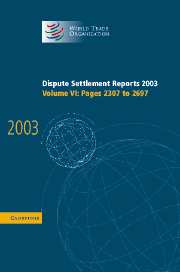Book contents
European Communities – Anti-Dumping Duties on Malleable Cast Iron Tube or Pipe Fittings from Brazil (WT/DS219): Report of the Appellate Body
Published online by Cambridge University Press: 13 December 2017
Summary
INTRODUCTION
Brazil appeals certain issues of law and legal interpretations in the Panel Report, European Communities – Anti-Dumping Duties on Malleable Cast Iron Tube or Pipe Fittings from Brazil (the “Panel Report”). The Panel was established to consider a complaint by Brazil concerning the consistency with the Agreement on Implementation of Article VI of the General Agreement on Tariffs and Trade 1994 (the “Anti-Dumping Agreement ”) and the General Agreement on Tariffs and Trade 1994 (the “GATT 1994”) of the imposition of anti-dumping duties by the European Communities on imports of malleable cast iron tube or pipe fittings from Brazil.
On 29 May 1999, the European Communities announced the initiation of an anti-dumping investigation on the imports of malleable cast iron tube or pipe fittings originating in Brazil and seven other countries. One Brazilian producer (Indústria de Fundição Tupy Ltda.) was subject to the anti-dumping investigation. The European Communities imposed provisional anti-dumping duties on the imports on 28 February 2000 and definitive anti-dumping duties on 11 August 2000. On 21 December 2000, Brazil requested consultations with the European Communities concerning the imposition of anti-dumping duties on its exports of malleable cast iron tube or pipe fittings to the European Communities. After consultations failed to resolve the dispute, Brazil requested the establishment of a panel on 7 June 2001 to examine the matter. The factual aspects of this dispute are set out in greater detail in the Panel Report.
Before the Panel, Brazil claimed that the European Communities had acted inconsistently with Article VI of the GATT 1994 and with a number of provisions of the Anti-Dumping Agreement, specifically, Articles 1, 2.2, 2.4, 2.4.1, 2.4.2, 3.1, 3.2, 3.3, 3.4, 3.5, 6.2, 6.4, 6.6, 6.9, 9.3, 11.1, 11.2, 12.2, 12.2.2, and 15.
In the Panel Report, circulated to Members of the World Trade Organization (the “WTO”) on 7 March 2003, the Panel found that the European Communities had acted inconsistently with its obligations under:
(a) Article 2.4.2 of the Anti-Dumping Agreement in “zeroing” negative dumping margins in its dumping determination; and
- Type
- Chapter
- Information
- Dispute Settlement Reports 2003 , pp. 2613 - 2688Publisher: Cambridge University PressPrint publication year: 2005



